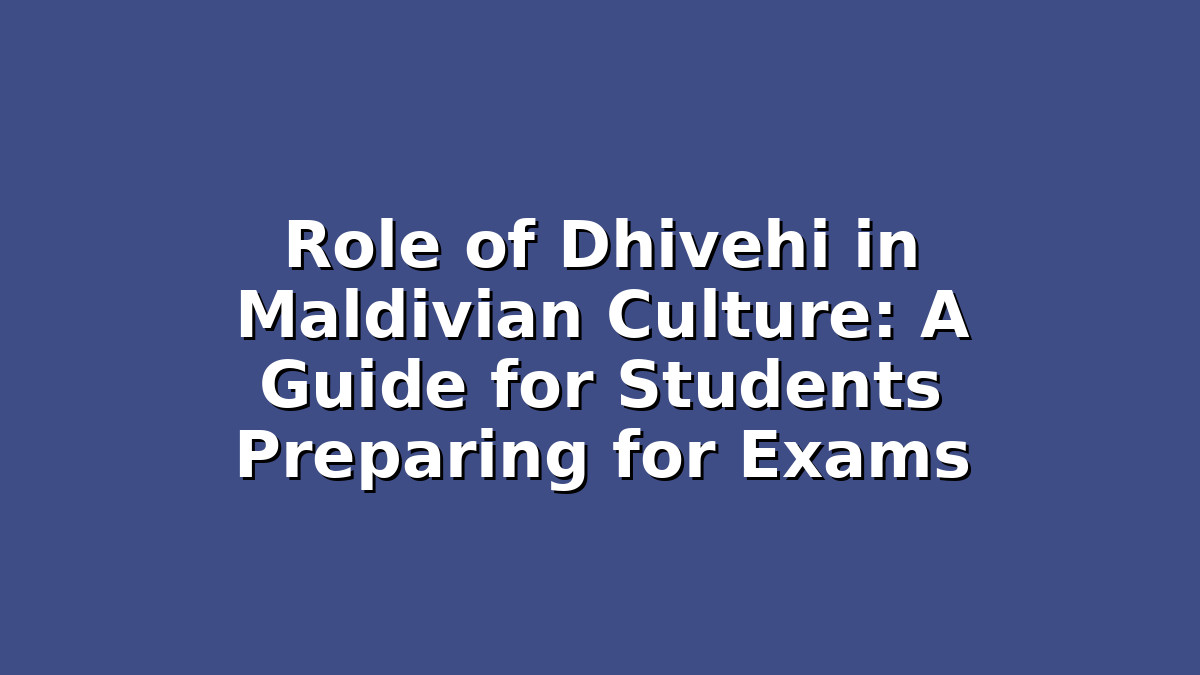Introduction
As students preparing for exams, it’s essential to understand not only the subjects you study but also the cultural context that shapes your learning and identity. One significant element of Maldivian culture is the Dhivehi language, the mother tongue of the Maldives. Dhivehi is more than just a means of communication; it carries the history, traditions, values, and collective memory of the Maldivian people. In this article, we will explore the role of Dhivehi in Maldivian culture and provide study tips to help you connect with your heritage while preparing effectively for exams.
Understanding the importance of Dhivehi can deepen your appreciation of your roots and enhance your learning experience. Let’s dive into three key aspects of Dhivehi’s role in Maldivian culture, each paired with practical advice to support your studies.
Section 1: Dhivehi as a Cultural Identity Marker
Dhivehi is a vital marker of Maldivian identity, distinguishing the Maldives from other countries and linking generations through a shared language. The language reflects the unique geography, lifestyle, and history of the island nation. From traditional songs and folktales to official documents and literature, Dhivehi carries the values and worldview of Maldivians.
Study Tip: Use Dhivehi to Connect with Your Study Material
If you are studying history or literature, try reading texts or listening to recordings in Dhivehi. This will help you grasp cultural nuances and make your learning more meaningful. For example, when preparing for exams on Maldivian history, engage with primary sources or folk narratives in Dhivehi to understand perspectives that might be missing in translated materials. Additionally, practicing Dhivehi can improve your language skills, which are often part of your curriculum.
By embracing Dhivehi as a cultural tool, you can enrich your academic experience and make your revision sessions more engaging.
Section 2: Dhivehi as a Medium of Education and Knowledge Transmission
Traditionally, Dhivehi has been the medium through which knowledge, beliefs, and social norms are passed down. Before the introduction of modern education systems and English as a medium of instruction, children learned from elders using Dhivehi. Even today, many concepts in Maldivian society are best understood through Dhivehi expressions and idioms that don’t always translate directly.
Study Tip: Incorporate Dhivehi in Your Note-Taking and Revision
Try taking some notes or summarizing important concepts in Dhivehi. This strategy can strengthen your understanding and recall. When you translate difficult ideas into your native language, it helps you internalize them better. Also, explaining concepts aloud in Dhivehi to family members or friends can reinforce your knowledge and improve your confidence.
Being bilingual or multilingual is an advantage in exams, and using Dhivehi alongside other languages can boost your cognitive flexibility and memory retention.
Section 3: Dhivehi as a Reflection of Social and Religious Values
Dhivehi also reflects the deep-rooted religious and social values of Maldivian culture. The language contains many phrases related to Islamic practices, which are central to Maldivian life. Understanding such expressions helps students appreciate the moral and ethical framework that influences social behavior and decision-making.
Study Tip: Relate Exam Topics to Cultural and Religious Contexts
When studying subjects like social studies, ethics, or religion, try to relate the content to the cultural significance embedded in Dhivehi expressions. For instance, learning Quranic verses or Islamic teachings in Dhivehi may deepen your comprehension and make memorization easier. You could also explore how traditional proverbs and sayings in Dhivehi convey moral lessons relevant to your studies.
Connecting academic material to your culture can make learning more relevant and motivate you to excel in your exams.
Conclusion
Dhivehi is much more than a language; it is a living expression of Maldivian culture, history, values, and identity. As students preparing for exams, embracing Dhivehi can enhance your academic journey by making your studies culturally meaningful, improving your language skills, and deepening your understanding of the social and religious contexts around you. By integrating Dhivehi into your study routines—whether through reading, note-taking, or relating concepts to cultural values—you can develop a stronger grasp of your subjects and a greater appreciation for your heritage.
Remember, your exam preparation is not just about memorizing facts but also about connecting with the knowledge in a way that feels relevant and inspiring. Use the power of Dhivehi to enrich your learning and approach your exams with confidence and pride.
Good luck with your studies!

Responses